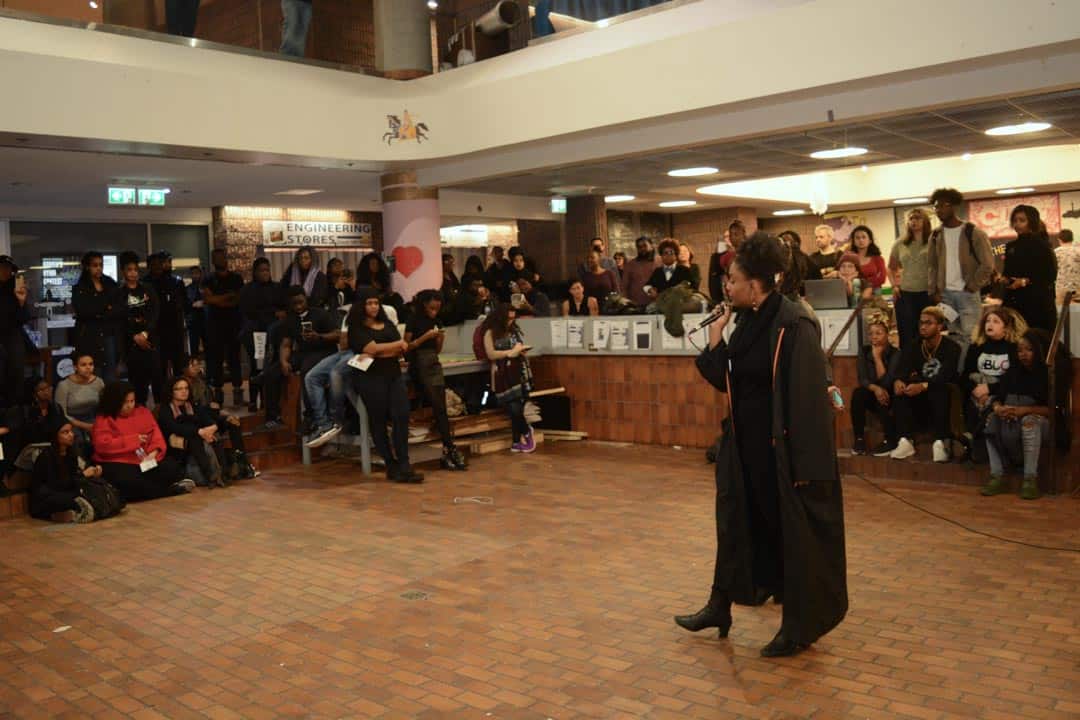The Black Students’ Association (BSA) organized a town hall on November 28 in response to a recent series of racist incidents in the Faculty of Applied Science and Engineering.
Dozens of students and faculty members gathered at the Sandford Fleming Building to share their experiences with anti-Black discrimination, find ways to eliminate racism on campus, and create a sense of community. U of T’s Black Liberation Collective (BLC) and the National Society of Black Engineers (NSBE) attended and co-organized the event.
In September, an international student in her first year of engineering approached the BSA with screenshots of two group chats in which three non-Black students repeatedly used the n-word and sent a picture depicting blackface.
One of the group chats consisted mainly of engineering students attending an orientation for incoming international undergrads. The racist remarks were initiated by one of the orientation leaders. The other group chat was a first-year civil engineering group.
In response to an email from the BSA, BLC, and NSBE outlining the racist incidents, Dean of the Faculty of Applied Science and Engineering Cristina Amon met with the respondents — the three students implicated in the anti-Black racism — to inform them that the incidents had been brought to her attention. Shortly after, an official investigation was initiated.
The email was also sent to Vice-Provost Students Sandy Welsh and the Anti-Racism and Cultural Diversity Office.
According to BSA President Anyika Mark, the three investigated students subsequently reached out to several Black students in hopes of finding the student who filed the complaint. Mark said that she is concerned about the safety of the complainant, especially with the recent white supremacist posters on campus.
“We’ve literally had to create a safety plan for her,” she said. “She’s the only Black student in her class so, sometimes we walk with her from classes and tutorials.”
Criticism, calls to action from the BSA
The BSA called for the expulsion of the three respondents, in addition to a $500 fine and 25 hours of community service, which are stipulated as possible sanctions in the Code of Student Conduct. Mark believes that there must be serious consequences in order to set a precedent for anyone who thinks that racial harassment is acceptable.
Other demands include an independent Black studies department, funding an anti-Black racism campaign on campus, funding NSBE, and a higher recruitment of Black faculty and staff members in the Faculty of Applied Science and Engineering.
Mark also added that they were told that the investigation may take up to a year. She believes that this process is long, bureaucratic, and intended to tire people out. “It’s meant to derail conversations about real social change,” she said.
The duration of Code of Student Conduct investigations varies on a case-by-case basis, according to U of T’s Director of Media Relations, Althea Blackburn-Evans. More complex cases may last up to 18 months, but resolutions are usually reached much sooner.
“The goal is to have a fair process in a timely manner if possible,” said Blackburn-Evans.
The BSA contested the language of the Code of Student Conduct, stating that the inclusion of specific terms such as “anti-Blackness” and “anti-Black racism” was crucial. U of T keeps its definition of discrimination very broad.
Blackburn-Evans emphasized that, because of the university’s diverse campus, its policies must remain broad in order to include all kinds of discrimination. “We make these broad references to ensure that our very diverse community is included in those policies.”
Another concern raised by Mark was the lack of policies that specifically address cyberbullying. U of T’s Code of Student Conduct does not include any mention of online harassment. Blackburns-Evans, however, stated that the legal terms used in the code may also cover online harassment.
Students at the town hall shared their experiences with anti-Blackness, expressed their frustration, and urged the university to support its Black students, faculty, and staff.
“Black representation in STEM matters,” said Mikhail Burke, a PhD candidate at U of T. He believes that anti-Blackness in the science community is due to a lack of representation. “We need to tackle one in order to tackle the other.”
Chimwemwe Alao, Vice-President Equity of the University of Toronto Students’ Union (UTSU) was present at the event, but not in his capacity as a representative of the union.
“There’s been a lot of conversation about racism on campus that I experience every single day,” said Alao. He said he was supporting his community and engaging in an “important conversation.” As a Black student, he said that racism is a daily experience and includes anything “from microaggression and small interactions to very overt incidents of anti-Blackness.”
Despite no official UTSU presence at the town hall, UTSU President Mathias Memmel said that anti-Blackness is a systemic problem. “The BSA’s efforts to counter anti-Black racism are important, and we support them.”


